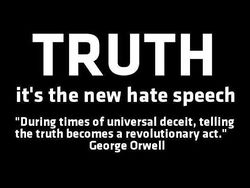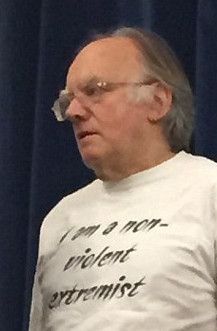Difference between revisions of "Non-violent extremism"
m (Robin moved page Non violent extremism to Non-violent extremism) |
|||
| (One intermediate revision by the same user not shown) | |||
| Line 3: | Line 3: | ||
|image=Non violent extremism.jpg | |image=Non violent extremism.jpg | ||
|description=An [[enemy image]] used to try to justify violent repression of those who advocate non-violent change. | |description=An [[enemy image]] used to try to justify violent repression of those who advocate non-violent change. | ||
| − | |constitutes=extremism, enemy image | + | |constitutes=extremism, enemy image, Orwellian language |
|so_called=1 | |so_called=1 | ||
|wikiquote= | |wikiquote= | ||
| Line 23: | Line 23: | ||
==Association with Violent extremism== | ==Association with Violent extremism== | ||
| + | {{SMWQ | ||
| + | |text=It can even be argued that ‘[[non-violent extremism]]’ is a contradiction in terms. While there can be non-violent and violent radicals, it makes, in my view and based on the distinction between radicalism and [[extremism]] elaborated above, less sense to distinguish between violent and non-violent extremists. | ||
| + | |authors=Alex P. Schmid | ||
| + | |source_details=p. 16 | ||
| + | |source_name=Radicalisation, De-Radicalisation, Counter-Radicalisation: A Conceptual Discussion and Literature Review | ||
| + | |date=March 2013 | ||
| + | |subjects=non-violent extremism, violent extremism, extremism | ||
| + | }} | ||
[[Alex Schmid]] published a paper in 2014 which stated that the distinction between "[[violent extremism]]" and "non-violent extremism" was illegitimate. | [[Alex Schmid]] published a paper in 2014 which stated that the distinction between "[[violent extremism]]" and "non-violent extremism" was illegitimate. | ||
Latest revision as of 16:30, 29 January 2019
(“extremism”, enemy image, Orwellian language) | |
|---|---|
 | |
| Interest of | • Counter Extremism Project • Alex Schmid |
| An enemy image used to try to justify violent repression of those who advocate non-violent change. | |
"Non violent extremism" is an enemy image currently being developed in UK for use against proponents of non-violence. It was launched in January 2011, 5 years after the phrase "violent extremism" was introduced in the wake of the 7/7 bombings. In 2015, UK Prime Minister Theresa May claimed that when “non-violent extremism goes unchallenged, the values that bind our society together fragment.” [1] In 2017, the conservative government were experiencing difficulties in using this phrase legislatively, due to its incompatibility with more long established traditions such as freedom of speech and human rights.[2]
Contents
Origins
The phrase "violent extremism" was launched in July 2005. "Non violent extremism" was launched in January 2011, according to Google trends data.

Association with Violent extremism
“It can even be argued that ‘non-violent extremism’ is a contradiction in terms. While there can be non-violent and violent radicals, it makes, in my view and based on the distinction between radicalism and extremism elaborated above, less sense to distinguish between violent and non-violent extremists.”
Alex P. Schmid (March 2013) [4]
Alex Schmid published a paper in 2014 which stated that the distinction between "violent extremism" and "non-violent extremism" was illegitimate.
Legislative problems
The Guardian reported in 2017 on the UK Government's plans to ban "non-violent extremism" by citing an anonymous "source close to the process" that "The bill is sinking without trace. They cannot get a working definition of extremism – lawyers are effectively saying it's incompatible with issues like free speech".[5]
Related Quotations
| Page | Quote | Author | Date |
|---|---|---|---|
| "Extremism" | “the distinction between “non-violent extremism” and “violent extremism” is not a valid one.” | Alex Schmid | May 2014 |
| RAND/Terrorism Chronology Database | “Since the RAND-St Andrews chronology only records those incidents that are ‘international’, the database is orientated towards the recording of attacks on foreign visitors to, and military occupiers of, relatively poor countries. By definition those victims are normally business representatives and military personnel from economically strong, normally Western, nations. The second observation, which reinforces this latter point, is that the Chronology explicitly excludes acts of state terror committed by any government against its own citizens, and acts of violence occurring in war or in war-like situations. Incidents involving Western armies of occupation and businesses are included in the Chronology only where they are victims rather than the perpetrators of violence. Third, some of the methodological inconsistencies in the use of data in the Chronology database are reminiscent of the counter-insurgency position. It is possible to find non-violent activities and protests against state violence recorded in the database as "terrorism."” | Jonny Burnett Dave Whyte |
References
- ↑ , 2015
- ↑ https://ukhumanrightsblog.com/2015/05/22/non-violent-extremism-some-questions-about-laws-and-limits-robert-gleave-and-lawrence-mcnamara/
- ↑ http://www.dailymail.co.uk/news/article-3906394/Jeremy-Corbyn-s-brother-Piers-gives-speech-alongside-notorious-Holocaust-denier-9-11-conspiracy-theorist.html
- ↑ Radicalisation, De-Radicalisation, Counter-Radicalisation: A Conceptual Discussion and Literature Review p. 16
- ↑ https://www.theguardian.com/politics/2017/jan/29/theresa-may-counter-terrorism-bill-sinking-without-trace-extremism-british-values
